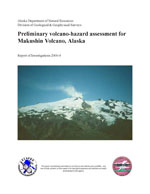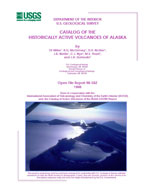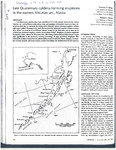Makushin CFE I
Start: 8790 yBP [1]
Event Type: Explosive
Max VEI: 5 [2]
- Tephrafall [1]
Description: From Beget and others (2000): "The oldest deposits of Makushin Volcano that post-date the last ice age record a series of very large eruptions, culminating in the development of a summit caldera (fig. 4 [in original text]). These eruptions began about 8,400 to 8,800 years ago, when a large debris avalanche occurred on the north flank of the volcano and traveled at least 10 kilometers to the coast. On the basis of bathymetry, this avalanche deposit may extend an additional 3 to 5 kilometers off-shore. The upper part of the avalanche deposit is gradational into very coarse grained surge deposits that record a lateral blast apparently coincident with the debris avalanche."
From Bean (1999): "Two early Holocene "caldera forming" eruptive events, dated at 8050 yr B.P. and ca. 8790 yr B.P. respectively, generated the vast bulk of pyroclastic debris which fill valleys proximal to the volcano. Total erupted volume for early Holocene unconsolidated deposits approaches 10 km 3. The eruptions produced very mobile pyroclastic flows that traveled as far as Dutch Harbor (25 km away) where they buried an ancient Native American culture in more than 30 cm of hot ash and rock fragments."
"A black sintered scoria deposit forms a resistant cap approximately two to four meters thick on lava flows and flat surfaces up to 1000-1500 m elevation on the east and northeast flanks of Makushin Volcano (Fig. 4.23 [in original text]). This unit can be traced to the Lava Ramp where it is not sintered and appears as a scoria fall or flow deposit, and to fans in Makushin Valley where it forms a very resistant sintered unit containing fossil fumaroles. Two radiocarbon samples taken from under this unit have been dated at 8730 and 8710 14 C yr B.P. This black sintered deposit is also present in the summit caldera (Fig 4.23 [in original text]) where it is well exposed at several locations along the eastern caldera rim. The scoria unit here unconformably overlies approximately fifty meters of dipping pink to tan coarse to fine surge deposits and breccias that were most likely deposited during the early phase of the same eruption. The dipping surges are stratigraphically correlated with base surges in Makushin Valley."
"The unit mapped as pyroclastic lag deposits are remnants of pyroclastic valley filling flow deposits. Generally only the highly resistant lower flow unit, a scoria agglutinate to sintered ignimbrite flow unit is still intact, the less resistant overlying members having weathered away."
The Global database on large magnitude explosive volcanic eruptions (LaMEVE; 2017) reports a magnitude of 6, bulk eruptive volume of 7.5 cubic km and a dense rock equivalent eruptive volume of 3.0 cubic km for the eruption.
From Bean (1999): "Two early Holocene "caldera forming" eruptive events, dated at 8050 yr B.P. and ca. 8790 yr B.P. respectively, generated the vast bulk of pyroclastic debris which fill valleys proximal to the volcano. Total erupted volume for early Holocene unconsolidated deposits approaches 10 km 3. The eruptions produced very mobile pyroclastic flows that traveled as far as Dutch Harbor (25 km away) where they buried an ancient Native American culture in more than 30 cm of hot ash and rock fragments."
"A black sintered scoria deposit forms a resistant cap approximately two to four meters thick on lava flows and flat surfaces up to 1000-1500 m elevation on the east and northeast flanks of Makushin Volcano (Fig. 4.23 [in original text]). This unit can be traced to the Lava Ramp where it is not sintered and appears as a scoria fall or flow deposit, and to fans in Makushin Valley where it forms a very resistant sintered unit containing fossil fumaroles. Two radiocarbon samples taken from under this unit have been dated at 8730 and 8710 14 C yr B.P. This black sintered deposit is also present in the summit caldera (Fig 4.23 [in original text]) where it is well exposed at several locations along the eastern caldera rim. The scoria unit here unconformably overlies approximately fifty meters of dipping pink to tan coarse to fine surge deposits and breccias that were most likely deposited during the early phase of the same eruption. The dipping surges are stratigraphically correlated with base surges in Makushin Valley."
"The unit mapped as pyroclastic lag deposits are remnants of pyroclastic valley filling flow deposits. Generally only the highly resistant lower flow unit, a scoria agglutinate to sintered ignimbrite flow unit is still intact, the less resistant overlying members having weathered away."
The Global database on large magnitude explosive volcanic eruptions (LaMEVE; 2017) reports a magnitude of 6, bulk eruptive volume of 7.5 cubic km and a dense rock equivalent eruptive volume of 3.0 cubic km for the eruption.
Images
References Cited
[1] The Holocene eruptive history of Makushin Volcano, Alaska, 1999
Bean, K. W., 1999, The Holocene eruptive history of Makushin Volcano, Alaska: University of Alaska Fairbanks unpublished M.S. thesis, Fairbanks, AK, 130 p.[2] Global database on large magnitude explosive volcanic eruptions (LaMEVE), 2012
Crosweller H.S., Arora, B., Brown, S.K., Cottrell, E., Deligne, N.I., Guerrero, N.O., Hobbs, L., Kiyosugi, K., Loughlin, S.C., Lowndes, J., Nayembil, M., 2012, Global database on large magnitude explosive volcanic eruptions (LaMEVE): Journal of Applied Volcanology, v. 1, n. 4, unpaged.[3] Late Quaternary caldera-forming eruptions in the eastern Aleutian arc, Alaska, 1987
Miller, T. P., and Smith, R. L., 1987, Late Quaternary caldera-forming eruptions in the eastern Aleutian arc, Alaska: Geology, v. 15, n. 5, p. 434-438.[4] Catalog of the historically active volcanoes of Alaska, 1998
Miller, T. P., McGimsey, R. G., Richter, D. H., Riehle, J. R., Nye, C. J., Yount, M. E., and Dumoulin, J. A., 1998, Catalog of the historically active volcanoes of Alaska: U.S. Geological Survey Open-File Report 98-0582, 104 p.[5] Volcanoes of North America: United States and Canada, 1990
Wood, C. A., and Kienle, Juergen, (eds.), 1990, Volcanoes of North America: United States and Canada: New York, Cambridge University Press, 354 p.[6] Preliminary volcano-hazard assessment for Makushin Volcano, Alaska, 2000
Beget, J. E., Nye, C. J., and Bean, K. W., 2000, Preliminary volcano-hazard assessment for Makushin Volcano, Alaska: Alaska Division of Geological & Geophysical Surveys Report of Investigation 2000-4, 22 p., 1 sheet, scale 1:100,000.Complete Eruption References
Makushin Volcano ash hazards, 2025
Dietterich, H.R., Schaefer, J.R., Larsen, J.F., Vallance, J.W., Van Eaton, A.R., and Wallace, K.L., 2025, Makushin Volcano ash hazards: Alaska Division of Geological & Geophysical Surveys Information Circular 86 v. 2, 2 p. https://doi.org/10.14509/31684
Volcanoes of the World, 2013
Global Volcanism Program, 2013, Volcanoes of the World, v. 4.5.3. Venzke, E (ed.): Smithsonian Institution. Downloaded 2017. http://dx.doi.org/10.5479/si.GVP.VOTW4-2013
Global database on large magnitude explosive volcanic eruptions (LaMEVE), 2012
Crosweller H.S., Arora, B., Brown, S.K., Cottrell, E., Deligne, N.I., Guerrero, N.O., Hobbs, L., Kiyosugi, K., Loughlin, S.C., Lowndes, J., Nayembil, M., 2012, Global database on large magnitude explosive volcanic eruptions (LaMEVE): Journal of Applied Volcanology, v. 1, n. 4, unpaged.
Preliminary volcano-hazard assessment for Makushin Volcano, Alaska, 2000
Beget, J. E., Nye, C. J., and Bean, K. W., 2000, Preliminary volcano-hazard assessment for Makushin Volcano, Alaska: Alaska Division of Geological & Geophysical Surveys Report of Investigation 2000-4, 22 p., 1 sheet, scale 1:100,000.

The Holocene eruptive history of Makushin Volcano, Alaska, 1999
Bean, K. W., 1999, The Holocene eruptive history of Makushin Volcano, Alaska: University of Alaska Fairbanks unpublished M.S. thesis, Fairbanks, AK, 130 p.

Catalog of the historically active volcanoes of Alaska, 1998
Miller, T. P., McGimsey, R. G., Richter, D. H., Riehle, J. R., Nye, C. J., Yount, M. E., and Dumoulin, J. A., 1998, Catalog of the historically active volcanoes of Alaska: U.S. Geological Survey Open-File Report 98-0582, 104 p.

Volcanoes of North America: United States and Canada, 1990
Wood, C. A., and Kienle, Juergen, (eds.), 1990, Volcanoes of North America: United States and Canada: New York, Cambridge University Press, 354 p.
Hard Copy held by AVO at FBKS - CEC shelf
Late Quaternary caldera-forming eruptions in the eastern Aleutian arc, Alaska, 1987
Miller, T. P., and Smith, R. L., 1987, Late Quaternary caldera-forming eruptions in the eastern Aleutian arc, Alaska: Geology, v. 15, n. 5, p. 434-438.
